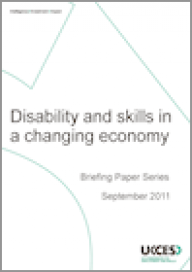Publications
 We author and publish a range of resources to keep you up to date with the latest developments in employment, labour market and human resource policy and practice.
We author and publish a range of resources to keep you up to date with the latest developments in employment, labour market and human resource policy and practice.
All our pdf publications are free to access.
-

Management practices and sustainable organisational performance: an analysis of the European Company Survey 2009
Cox A, Higgins T and Speckesser S | Sep 2011 | European Foundation for the Improvement of Living and Working ConditionsThis report is based on secondary data analysis of Eurofound’s European Company Survey (ECS) 2009. It explores the links between a broad range of workplace practices and sustainable organisational performance, building on the survey report. The report develops a theoretical and analytical framework against which questions from the ECS are mapped and then subjected to a range of multivariate analyses.
-

Industrial relations and working conditions developments in Europe 2010
Sweeney B, Curtarelli M, Aumayr C, Vargas O, Cabrita J, Broughton A | Sep 2011 | European Foundation for the Improvement of Living and Working ConditionsWith a particular focus on the crisis and responses to it, this annual review highlights developments in working conditions and industrial relations in the EU Member States and Norway in 2010, both at national and EU level.
-

Leadership and worker involvement on the Olympic Park
Lucy D, Tamkin P, Tyers C, Hicks B | Sep 2011 | Health and Safety ExecutiveThe HSE commissioned this research into leadership and worker involvement across projects on the Olympic Park to understand the degree to which approaches impacted positively or negatively and could be transferable to other construction projects and industries. This research project sought to explore the range of initiatives and approaches used, their impact on worker involvement, attitudes and behaviours, and other desired outcomes and the context in which they were effective or ineffective.
-

Routes onto Employment and Support Allowance
Sissons P, Barnes H, Stevens H | Aug 2011 | Department for Work and Pensions (DWP)This report presents findings from a two-wave survey of people who claimed ESA between April and June 2009. It examines the social characteristics of ESA claimants and their employment trajectories over a period of approximately 18 months. The aim of the report is to provide information about who flows onto, and off ESA and the reasons for doing so.
-

Obtaining Customer Feedback on HR
Finding out what managers and employees think of HR services and the HR function
Carter A, Hirsh W, Mercer M, Reilly P | Aug 2011 | Institute for Employment StudiesThere continues to be a lively debate in organisations about whether to seek the views of customers about HR (and which customers to ask) and, if so, how to go about it. By talking to a number of different organisations, IES researchers looked at why they chose to do so, and the varying methods used.
-

Workplaces and Social Networking
The Implications for Employment Relations
Broughton A, Higgins T, Hicks B, Cox A | Aug 2011 | Advisory, Conciliation and Arbitration Service (Acas)This report sets out the results of a small-scale research project commissioned by Acas examining the implications of social networking and mobile information and communications technologies (ICT) for employment relations.
-

Work-Focused Services in Children's Centres Pilot: Final Report
Marangozov R, Stevens H | Aug 2011 | Department for Work and Pensions (DWP)This report presents final findings from the evaluation of the ‘Work-Focused Services in Children’s Centres’ Pilot. A baseline and interim evaluation report have already been published. This final report builds on all the findings from these previous evaluation reports and research components, as well as Management Information.
-

Voluntary Gender Equality Reporting in Organisations with 150 to 249 Employees
Dewson S, Gloster R, Chubb C, Carta E, Reilly P | Aug 2011 | Government Equalities Office (GEO)This report was produced for the GEO by the Institute for Employment Studies and aimed to understand transparency on gender pay gaps and workforce diversity in organisations with between 150 and 249 employees. It investigated both the propensity of organisations of this size to be open about pay and diversity in their organisation and what they do analyse and report on.
-

Top Employers for Working Families - Benchmarking Report 2011
Swan J, Morris L, Mercer M and Jackson S | Aug 2011 | Working FamiliesIn terms of engagement and motivation, the evidence shows that well-managed flexibility elicits higher performance and the potential business benefits of flexible working on productivity, financial performance, quality, employee attraction, retention, commitment and reduced absence are well documented. Many organisations have deployed flexible working in the recession with great success. This benchmark aims to provide data and a crucial insight into what is currently working in practice, what needs to work, and the direction of future organisational focus.
-

Disability and Skills in a Changing Economy
Meager N, Higgins T | Aug 2011 | UK Commission for Equality and Skills (UKCES)The UK Commission developed a series of Briefing Papers with a focus on equality and skills in a changing economy. The aim was to inform and enable connected thinking about how to enable opportunity in the labour market through skills. Each paper provided commentary and analysis for an equality group or theme: disability and skills in a changing economy; gender and skills in a changing economy; low skills and social disadvantage in a changing economy; older people and skills in a changing economy and spatial inequality and skills in a changing economy.
